英语基础学习方法
如何学好英语的方法有什么技巧

如何学好英语的方法有什么技巧1.建立良好的学习计划:制定一个明确的学习目标,并将其分解为每日、每周或每月的小目标。
制定一个合理的时间表,每天分配一些时间来学习并复习英语。
2.基础知识的学习:首先要学好英语的基础知识,包括词汇、语法和句型。
可以通过学习课本、参加英语培训班或听力课程来建立起语言的基础。
3.多听多读多写:听力是学好英语的基础。
通过听英语新闻、电视节目、广播等,培养自己的听力能力,同时也可以提高自己的口语表达能力。
读英语原著和材料有助于学习更多的词汇和语法,并提高阅读理解能力。
写作可以帮助你更好地运用所学的英语知识。
4.听说读写并重:在学习语言时,要注意综合四项技能的训练。
不能只注重其中一项,其他三项都要平衡发展。
通过每天进行有针对性的听说读写练习,可以更系统地提高自己的语言水平。
5.多与人交流:只有不断地练习口语,才能真正掌握英语。
与母语为英语的人交流,可以帮助你提高听力和口语表达能力。
如果条件不允许,可以通过参加英语角或找英语外教进行口语练习。
6.创造英语学习环境:尽可能地让自己沉浸在英语环境中,可以通过看英语电影、听英语歌曲、阅读英语杂志等来提高自己的语感和语言理解能力。
7.利用科技学习:利用手机应用、语言学习网站和英语应用程序可以提供额外的资源和练习机会。
例如使用英语学习应用、单词卡片应用和在线英语课程等。
8.养成坚持学习的习惯:学好英语需要长期的坚持和练习,不能指望一蹴而就。
每天坚持进行一定量的学习,即使只是一小段时间,也能获得积累。
9.学习策略与技巧:选择适合自己的学习方法和技巧,如使用记忆法来记忆单词、语法规则和短语;利用联想和图像来加深记忆;通过创意写作或讲故事来帮助理解和记忆等。
10.正确使用教材:选择适合自己水平的教材进行学习,并利用教材中的练习和作业加强对知识的消化和理解。
同时,也可以选择不同类型的教材和练习,以丰富学习内容。
11.参加考试和证书:参加英语考试和获得相关的证书,可以增加学习的动力和目标感。
英语零基础怎么自学 有哪些学习方法

英语零基础怎么自学有哪些学习方法英语学习的方法有很多:每天积累单词、跟读广播、背牛津大辞典、题海战术……乃至最近备受人推崇的看美剧学英语,但是重要的不是方法,而是选定方法后从一而终的态度。
英语零基础怎么自学1英语零基础自学的方法1.首先学好音标,不管是英式还是美式,看自己喜欢。
很多时候把音标练好,对背单词,说句子都有很大的帮助。
这就好像是打地基,这个必须得坚实牢靠啊!所以想学好口语和发音,不,是想学好英语的同学,尤其是对腔调有要求的童鞋,音标一定要好。
2.增加词汇储备。
推荐一个背单词的方法:刚记背过的单词,前期的复习频率必须要频繁一点,等我们大脑已经习惯之后,就可以降低频率了,比如今天背的单词或是缀词词根,第二天一定要复习,然后是第五天,第七天,第十天,十五天,一个月,两个月,三个月。
自己可以建立一个Excel,然后制定计划,及时更新数据。
这样会有一个直观感受,也不会慌乱。
其实这个记忆的方法,不单单只是记忆单词,你在要记背其他资料的时候,都可以运用这个方法,很有效果的!背了的东西到死都不会忘记。
3.练习造句。
当你音标过硬,单词过关,这个时候就要考虑怎样造句练习了。
不知道你们有没有观察那些小孩子呀呀呓语,他们有时候都是一个单词,或者一个词组,然后断断续续的来表明自己的意思,渐渐的习惯之后,就能够流利地表达出一个完整的句子了。
2英语零基础如何自学1、明确自己的目的,然后就是给自己制定学习计划,找到适合自己的学习方法。
英语学习包括听说读写,要想学好英语这四者哪一个都不能落下,他们就像是四胞胎一样,相互关联。
2、英语语法并不多,难度也不大,只要认真去学都能学会。
语法是最基本的知识,也是学好英语的基础,把一些易混语法知识点放在一起对比学习往往能起到绝佳的效果。
学语法时不要得过且过,叫不准的地方就要拿出咬文嚼字的精神去学会它。
3、英语单词是必须要背会的,尤其是初高中单词一定要掌握,因为考试时会考到。
英语单词不光要背会,还要知道怎么用,知道在阅读中是什么意思,这对做阅读理解很有帮助。
英语入门自学零基础的方法
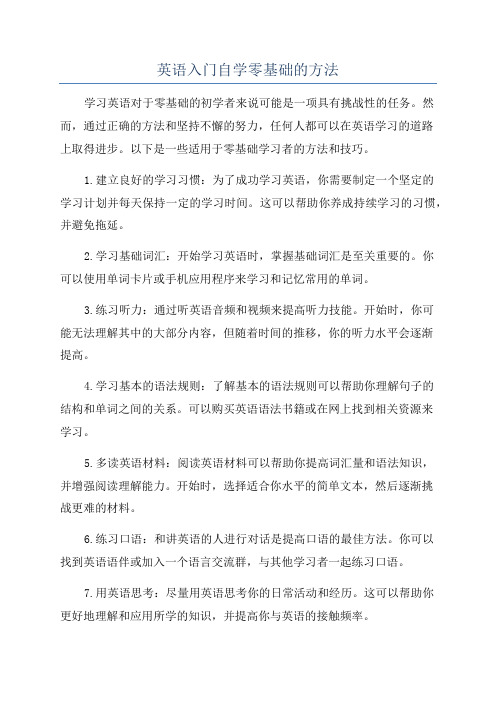
英语入门自学零基础的方法学习英语对于零基础的初学者来说可能是一项具有挑战性的任务。
然而,通过正确的方法和坚持不懈的努力,任何人都可以在英语学习的道路上取得进步。
以下是一些适用于零基础学习者的方法和技巧。
1.建立良好的学习习惯:为了成功学习英语,你需要制定一个坚定的学习计划并每天保持一定的学习时间。
这可以帮助你养成持续学习的习惯,并避免拖延。
2.学习基础词汇:开始学习英语时,掌握基础词汇是至关重要的。
你可以使用单词卡片或手机应用程序来学习和记忆常用的单词。
3.练习听力:通过听英语音频和视频来提高听力技能。
开始时,你可能无法理解其中的大部分内容,但随着时间的推移,你的听力水平会逐渐提高。
4.学习基本的语法规则:了解基本的语法规则可以帮助你理解句子的结构和单词之间的关系。
可以购买英语语法书籍或在网上找到相关资源来学习。
5.多读英语材料:阅读英语材料可以帮助你提高词汇量和语法知识,并增强阅读理解能力。
开始时,选择适合你水平的简单文本,然后逐渐挑战更难的材料。
6.练习口语:和讲英语的人进行对话是提高口语的最佳方法。
你可以找到英语语伴或加入一个语言交流群,与其他学习者一起练习口语。
7.用英语思考:尽量用英语思考你的日常活动和经历。
这可以帮助你更好地理解和应用所学的知识,并提高你与英语的接触频率。
8.制定学习目标:为了保持动力和目标感,你可以设置短期和长期的学习目标。
这可以帮助你跟踪自己的进步,并激励你更多地投入学习。
9.利用技术工具:使用各种英语学习应用程序、网站和在线资源可以帮助你学习英语。
这些工具提供了丰富的学习材料和交互式练习,可以加快你的学习进度。
10.学习文化背景:英语不仅是一门语言,还有其独特的文化背景。
了解英语国家的文化习俗、风俗和传统可以帮助你更全面地理解和应用所学的英语知识。
总的来说,学习英语需要耐心、毅力和坚持不懈的努力。
通过以上的方法和技巧,你可以逐渐掌握英语基础,并不断提高自己的英语水平。
英语怎么打好基础知识
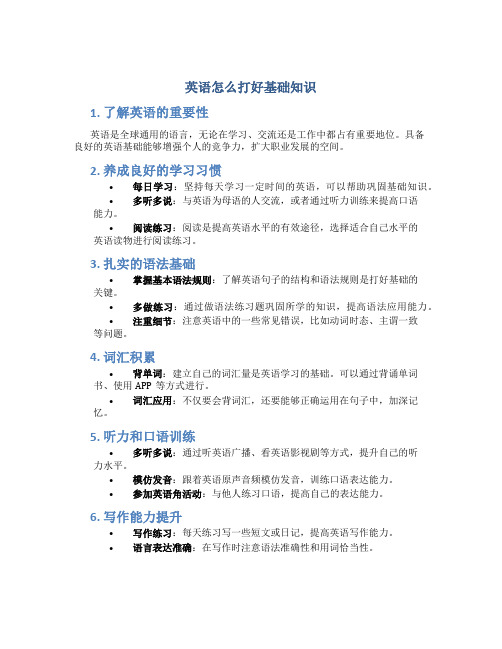
英语怎么打好基础知识1. 了解英语的重要性英语是全球通用的语言,无论在学习、交流还是工作中都占有重要地位。
具备良好的英语基础能够增强个人的竞争力,扩大职业发展的空间。
2. 养成良好的学习习惯•每日学习:坚持每天学习一定时间的英语,可以帮助巩固基础知识。
•多听多说:与英语为母语的人交流,或者通过听力训练来提高口语能力。
•阅读练习:阅读是提高英语水平的有效途径,选择适合自己水平的英语读物进行阅读练习。
3. 扎实的语法基础•掌握基本语法规则:了解英语句子的结构和语法规则是打好基础的关键。
•多做练习:通过做语法练习题巩固所学的知识,提高语法应用能力。
•注重细节:注意英语中的一些常见错误,比如动词时态、主谓一致等问题。
4. 词汇积累•背单词:建立自己的词汇量是英语学习的基础。
可以通过背诵单词书、使用APP等方式进行。
•词汇应用:不仅要会背词汇,还要能够正确运用在句子中,加深记忆。
5. 听力和口语训练•多听多说:通过听英语广播、看英语影视剧等方式,提升自己的听力水平。
•模仿发音:跟着英语原声音频模仿发音,训练口语表达能力。
•参加英语角活动:与他人练习口语,提高自己的表达能力。
6. 写作能力提升•写作练习:每天练习写一些短文或日记,提高英语写作能力。
•语言表达准确:在写作时注意语法准确性和用词恰当性。
7. 掌握语境和文化背景•了解英语国家文化:学习英语不仅仅是掌握语言,还要了解英语国家的文化和习俗,帮助理解语境。
•多接触英语环境:如果有条件,可以到英语国家留学或旅行,提高自己的英语交流能力。
结语打好英语基础知识是学习英语的第一步,只有扎实的基础才能在后续学习中取得更好的成绩。
通过坚持练习和多方面提升,相信你一定可以掌握好英语基础知识,为更高阶段的学习打下坚实的基础。
零基础学英语快有效的方法
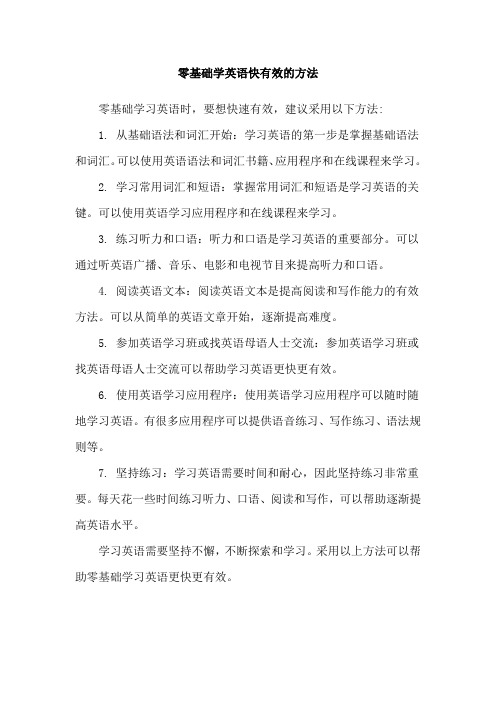
零基础学英语快有效的方法
零基础学习英语时,要想快速有效,建议采用以下方法:
1. 从基础语法和词汇开始:学习英语的第一步是掌握基础语法和词汇。
可以使用英语语法和词汇书籍、应用程序和在线课程来学习。
2. 学习常用词汇和短语:掌握常用词汇和短语是学习英语的关键。
可以使用英语学习应用程序和在线课程来学习。
3. 练习听力和口语:听力和口语是学习英语的重要部分。
可以通过听英语广播、音乐、电影和电视节目来提高听力和口语。
4. 阅读英语文本:阅读英语文本是提高阅读和写作能力的有效方法。
可以从简单的英语文章开始,逐渐提高难度。
5. 参加英语学习班或找英语母语人士交流:参加英语学习班或找英语母语人士交流可以帮助学习英语更快更有效。
6. 使用英语学习应用程序:使用英语学习应用程序可以随时随地学习英语。
有很多应用程序可以提供语音练习、写作练习、语法规则等。
7. 坚持练习:学习英语需要时间和耐心,因此坚持练习非常重要。
每天花一些时间练习听力、口语、阅读和写作,可以帮助逐渐提高英语水平。
学习英语需要坚持不懈,不断探索和学习。
采用以上方法可以帮助零基础学习英语更快更有效。
学基础英语的方法-零基础学英语方法
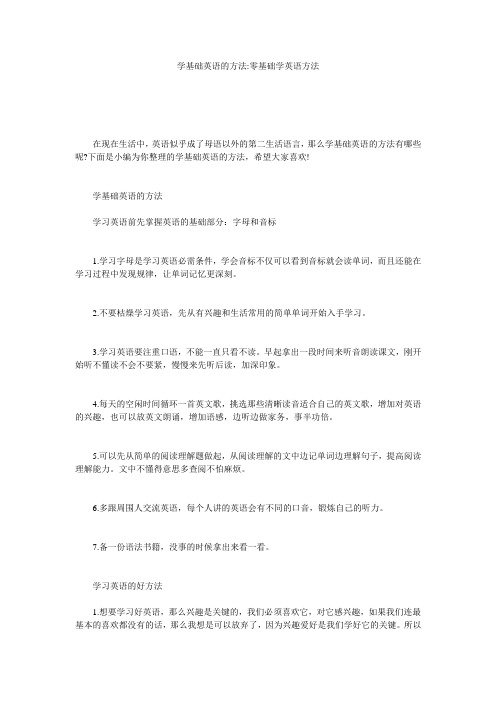
学基础英语的方法:零基础学英语方法在现在生活中,英语似乎成了母语以外的第二生活语言,那么学基础英语的方法有哪些呢?下面是小编为你整理的学基础英语的方法,希望大家喜欢!学基础英语的方法学习英语前先掌握英语的基础部分:字母和音标1.学习字母是学习英语必需条件,学会音标不仅可以看到音标就会读单词,而且还能在学习过程中发现规律,让单词记忆更深刻。
2.不要枯燥学习英语,先从有兴趣和生活常用的简单单词开始入手学习。
3.学习英语要注重口语,不能一直只看不读。
早起拿出一段时间来听音朗读课文,刚开始听不懂读不会不要紧,慢慢来先听后读,加深印象。
4.每天的空闲时间循环一首英文歌,挑选那些清晰读音适合自己的英文歌,增加对英语的兴趣,也可以放英文朗诵,增加语感,边听边做家务,事半功倍。
5.可以先从简单的阅读理解题做起,从阅读理解的文中边记单词边理解句子,提高阅读理解能力。
文中不懂得意思多查阅不怕麻烦。
6.多跟周围人交流英语,每个人讲的英语会有不同的口音,锻炼自己的听力。
7.备一份语法书籍,没事的时候拿出来看一看。
学习英语的好方法1.想要学习好英语,那么兴趣是关键的,我们必须喜欢它,对它感兴趣,如果我们连最基本的喜欢都没有的话,那么我想是可以放弃了,因为兴趣爱好是我们学好它的关键。
所以我们一定要培养自己的兴趣爱好。
2.单词量是学好英语的基础,所以要想学好英语就要每天坚持被单词,你脑海里的单词量越多越有利于你的阅读,如果看到一篇文章,你练最基本的翻译都翻译不出来的话,那么是很难看懂这篇文章的。
所以不管是什么阶段的英语教学都要背好单词。
不断地积累单词量。
3.语法也很重要,英语中的语法不多,所以只要我们掌握好记住好每一种语法和状态,这样有利于我们阅读文章。
多多的阅读。
联系语法最简单的事情就是每天坚持写日记,打自己的生活用英语记录下来,这样你的写作也得到了提高4.掌握好单词和语法,我们就已经很优秀了,如果我们还想提高我们的英语水平的话我们可以适当的阅读,可以看看英语的报刊,或者看看的英语的书本,在我看来,看美剧是提高英语的最好方法,当然你不能只看屏幕哦,看到好的语法的时候一定要暂停下来研究一下某一段话的经典。
如何零基础学英语方法
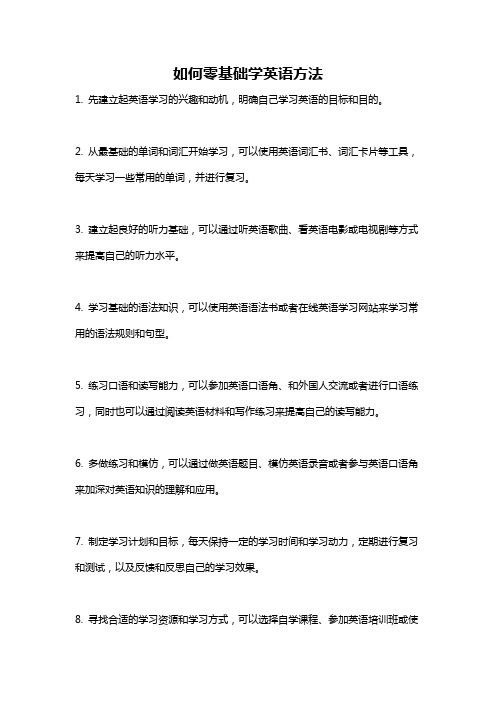
如何零基础学英语方法
1. 先建立起英语学习的兴趣和动机,明确自己学习英语的目标和目的。
2. 从最基础的单词和词汇开始学习,可以使用英语词汇书、词汇卡片等工具,每天学习一些常用的单词,并进行复习。
3. 建立起良好的听力基础,可以通过听英语歌曲、看英语电影或电视剧等方式来提高自己的听力水平。
4. 学习基础的语法知识,可以使用英语语法书或者在线英语学习网站来学习常用的语法规则和句型。
5. 练习口语和读写能力,可以参加英语口语角、和外国人交流或者进行口语练习,同时也可以通过阅读英语材料和写作练习来提高自己的读写能力。
6. 多做练习和模仿,可以通过做英语题目、模仿英语录音或者参与英语口语角来加深对英语知识的理解和应用。
7. 制定学习计划和目标,每天保持一定的学习时间和学习动力,定期进行复习和测试,以及反馈和反思自己的学习效果。
8. 寻找合适的学习资源和学习方式,可以选择自学课程、参加英语培训班或使
用在线英语学习平台。
9. 与其他学习者互相交流和学习,可以参加英语学习小组或寻找学习伙伴,共同学习和进步。
10. 坚持和持续学习,每天保持一定的学习时间和学习动力,不断积累和提高自己的英语水平。
如何从基础学英语【3篇】
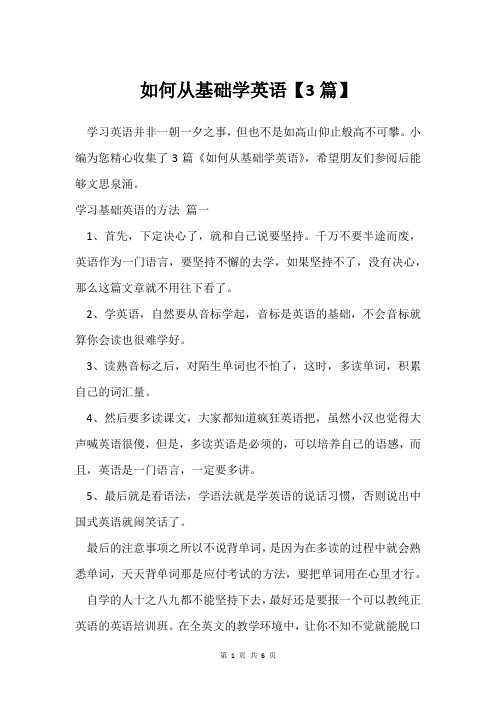
如何从基础学英语【3篇】学习英语并非一朝一夕之事,但也不是如高山仰止般高不可攀。
小编为您精心收集了3篇《如何从基础学英语》,希望朋友们参阅后能够文思泉涌。
学习基础英语的方法篇一1、首先,下定决心了,就和自己说要坚持。
千万不要半途而废,英语作为一门语言,要坚持不懈的去学,如果坚持不了,没有决心,那么这篇文章就不用往下看了。
2、学英语,自然要从音标学起,音标是英语的基础,不会音标就算你会读也很难学好。
3、读熟音标之后,对陌生单词也不怕了,这时,多读单词,积累自己的词汇量。
4、然后要多读课文,大家都知道疯狂英语把,虽然小汉也觉得大声喊英语很傻,但是,多读英语是必须的,可以培养自己的语感,而且,英语是一门语言,一定要多讲。
5、最后就是看语法,学语法就是学英语的说话习惯,否则说出中国式英语就闹笑话了。
最后的注意事项之所以不说背单词,是因为在多读的过程中就会熟悉单词,天天背单词那是应付考试的方法,要把单词用在心里才行。
自学的人十之八九都不能坚持下去,最好还是要报一个可以教纯正英语的英语培训班。
在全英文的教学环境中,让你不知不觉就能脱口说英语。
学习基础英语的方法篇二零基础成人怎么学好英语1、根据学员英语基础设计合理的教学课程根据学员本身的英语基础,准备适合的教学素材,从最基础的英语字母、音标等开始学起。
通常来说,只要成年人的英语学习能力和接受能力不错,那么在学习英语时进步是非常明显的,毕竟零基础的成年人在学英语的过程中并没有任何不良的英语学习习惯和不正确的学习方法。
2、根据学员的兴趣特点安排合适的外教老师根据每个学员的兴趣特点,安排能够针对学员的要求和学习目标,进行专业指导和制定合理学习计划的外教老师。
3、根据学员的学习进度制定系统的复习计划英语学习课程是为每个学员量身定制,同时在课程结束后,老师会及时了解每个学员的学习情况和接受程度,并根据所掌握的这些情况给予专业的指导意见,让学员能够很清楚的知道自己在目前的学习过程中是否已经获得成效,帮助自己在接下来的学习过程中制定更合理的学习目标。
没英语基础怎么学英语方法

没英语基础怎么学英语方法
如果你没有英语基础,以下是一些学习英语的方法:
1. 学习基本的英语单词和短语:开始学习一些常用的英语单词和短语,例如问候语、数字、颜色、家庭成员和日常活动。
这将帮助你建立起最基本的英语词汇。
2. 注册参加英语课程:参加正式的英语课程可以为你提供指导和系统的学习方法。
你可以在学校、语言学校或在线英语课程中注册。
3. 找一个语言交换伙伴:寻找一个以英语为母语的朋友,每周和他们进行一次语言交流。
你可以通过互相纠正口语错误和互相练习提高英语水平。
4. 多听英语:多听英语的录音和音频。
你可以通过收听英语广播、英语歌曲、英语播客或英语电台来提高你的听力技巧。
5. 多看英语材料:多阅读英语材料,例如英语文档、英语新闻、英语杂志和小说。
初始阶段可以通过简化版的英语阅读材料和儿童读物开始。
6. 利用英语学习应用程序和网站:下载一些英语学习应用程序和浏览一些英语学习网站,它们可以提供语法练习、单词记忆和口语练习等学习资源。
7. 练习口语:尽量多说英语,无论是和语言交换伙伴、外教还是在实际生活中
与他人交流。
不要担心犯错误,重要的是勇敢地去尝试。
8. 看英文字幕的电影和电视剧:开始时可以通过看带有英文字幕的电影和电视剧来提高听力和阅读能力。
9. 创造英语环境:尽量将你的日常生活中的事务转化为英语环境,例如在家中张贴一些英语单词和短语,将手机和电脑语言设置为英语等。
重要的是要保持学习的积极心态和坚持不懈地练习。
尽管开始的时候可能会有困难,但随着时间的推移和不断的练习,你的英语水平将会提高。
零基础学英语的方式
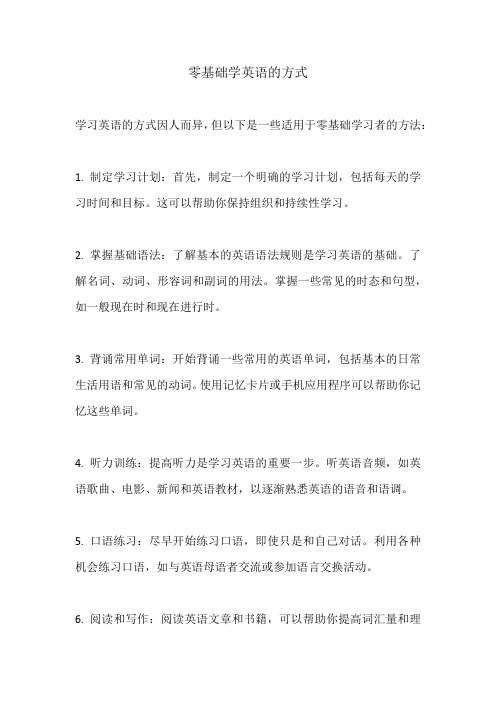
零基础学英语的方式学习英语的方式因人而异,但以下是一些适用于零基础学习者的方法:1. 制定学习计划:首先,制定一个明确的学习计划,包括每天的学习时间和目标。
这可以帮助你保持组织和持续性学习。
2. 掌握基础语法:了解基本的英语语法规则是学习英语的基础。
了解名词、动词、形容词和副词的用法。
掌握一些常见的时态和句型,如一般现在时和现在进行时。
3. 背诵常用单词:开始背诵一些常用的英语单词,包括基本的日常生活用语和常见的动词。
使用记忆卡片或手机应用程序可以帮助你记忆这些单词。
4. 听力训练:提高听力是学习英语的重要一步。
听英语音频,如英语歌曲、电影、新闻和英语教材,以逐渐熟悉英语的语音和语调。
5. 口语练习:尽早开始练习口语,即使只是和自己对话。
利用各种机会练习口语,如与英语母语者交流或参加语言交换活动。
6. 阅读和写作:阅读英语文章和书籍,可以帮助你提高词汇量和理解能力。
尝试写一些简单的英语日记或短文,以锻炼写作能力。
7. 寻找学习资源:利用互联网上的免费学习资源,如在线课程、学习网站和应用程序,来提供额外的学习材料和练习。
8. 参加英语课程:考虑参加正式的英语课程,或者请一个私人英语教师来指导你的学习。
他们可以为你提供个性化的指导和反馈。
9. 练习语法和词汇:除了学习语法和词汇规则之外,你还需要不断进行练习。
做语法和词汇练习题,以加深对规则和用法的理解。
10. 坚持和反馈:学习英语需要持之以恒的努力和耐心。
持续练习,并寻求他人的反馈和建议,以不断改进自己的英语能力。
请注意,这只是一个零基础学习英语的简要指南。
每个人的学习方式和速度都不同,所以要根据个人情况调整学习计划和方法。
英语的学习方法有哪些

英语的学习方法有哪些1.创造语言环境创建一个英语学习的环境对于提高英语能力非常重要。
可以使用英语软件、音频或视频课程,以及和英语为母语的人交流,这样可以帮助你熟悉英语的听力和口语。
2.系统地学习语法学习语法是学习英语的基础,可以通过参加语法课程或者自学学习语法。
掌握语法规则,可以帮助你更好地理解英语句子的结构和用法。
3.多听多说多读多写这是提高英语能力的关键。
多听英语新闻、英语音频和英语影视剧,提高自己的听力能力。
多和英语为母语的人交流,提高自己的口语能力。
多读英语小说、英语杂志和英语报纸,提高自己的阅读能力。
平时可以多进行英语写作练习,提高自己的写作能力。
4.背诵和模仿背诵和模仿是学习英语的有效方法之一、可以选择一些优秀的英语文章或者诗歌进行背诵,并模仿里面的语调、语音和语法进行口语练习。
5.利用网络资源互联网上有很多免费的英语学习资源,例如英语学习网站、英语学习APP等。
可以通过这些资源进行词汇、语法、听力等方面的学习和练习。
6.练习听力听力是学习英语的重要能力之一、可以通过收听英语新闻、英语广播和英语录音等方式进行听力练习。
刚开始可以选择一些简单的材料,逐渐提高难度。
7.阅读英语原版书籍阅读英语原版书籍可以帮助提高阅读能力和扩展词汇量。
可以选择一些适合自己水平的英语原版小说、故事书和杂志进行阅读。
8.多写作英语写作是提高英语能力和总结英语知识的一种方式。
可以根据自己的兴趣和经历写日记、作文和文章等,提高自己的写作能力。
9.加入英语学习小组加入一个英语学习小组可以与其他学习英语的人交流和学习。
可以相互订正作文、互相激励,提高自己的学习兴趣和积极性。
10.培养学习习惯学习英语需要长期坚持和努力,培养良好的学习习惯非常重要。
可以制定学习计划,每天安排一定的时间进行英语学习和练习。
总之,学习英语需要耐心和毅力,通过多听多说多读多写,掌握语法和词汇,利用网络资源和参与英语学习小组等方法,可以帮助提高英语能力。
零基础学英语的办法和技巧

零基础学英语的办法和技巧
1. 建立学习目标:确定自己想要达到的英语能力水平,并为此设定一个具体的时间表。
2. 制定学习计划:制定一个每天的学习计划,包括指定的学习时间和学习内容,例如每日单词学习、阅读练习和听力训练等。
3. 注重学习基础知识:学习英语的基础知识包括英语字母、发音规则和基本语法。
将这些基础知识作为你的学习的起点,并逐渐扩展。
4. 多听多读:通过听英语音频、看英文电影或电视剧、读英语文章等,培养自己的听力和阅读能力。
这样可以帮助你增加语感和词汇量。
5. 多说多写:勤练口语和写作。
可以通过与其他英语学习者或者英语母语者交流,也可以通过写日记或随笔等方式进行写作练习。
这样可以帮助你提高表达能力和扩充词汇。
6. 创造语言环境:尽量让自己置身于英语环境中,比如参加英语角、加入英语学习社群等。
这样可以帮助你提高英语交流能力和自信心。
7. 制作学习资源:制作英语学习卡片、学习笔记和复习资料等,可以帮助你巩固所学知识,并提供便利的复习途径。
8. 制定奖惩机制:为自己设定小目标,并制定相应的奖惩机制。
当你达到某个目标时,奖励自己,激励自己更加努力学习。
9. 结合兴趣爱好:将自己感兴趣的领域与英语学习结合起来,比如看英文小说、听英语音乐等,这样可以提高学习的动力和兴趣。
10. 坚持不懈:学习英语是一个长期的过程,要有耐心和毅力。
无论遇到什么困难,都要坚持下去并相信自己能够取得进步。
英语入门自学零基础的方法
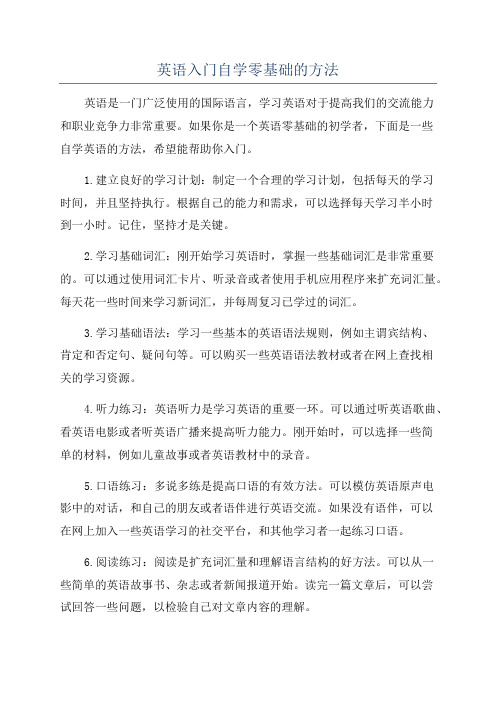
英语入门自学零基础的方法英语是一门广泛使用的国际语言,学习英语对于提高我们的交流能力和职业竞争力非常重要。
如果你是一个英语零基础的初学者,下面是一些自学英语的方法,希望能帮助你入门。
1.建立良好的学习计划:制定一个合理的学习计划,包括每天的学习时间,并且坚持执行。
根据自己的能力和需求,可以选择每天学习半小时到一小时。
记住,坚持才是关键。
2.学习基础词汇:刚开始学习英语时,掌握一些基础词汇是非常重要的。
可以通过使用词汇卡片、听录音或者使用手机应用程序来扩充词汇量。
每天花一些时间来学习新词汇,并每周复习已学过的词汇。
3.学习基础语法:学习一些基本的英语语法规则,例如主谓宾结构、肯定和否定句、疑问句等。
可以购买一些英语语法教材或者在网上查找相关的学习资源。
4.听力练习:英语听力是学习英语的重要一环。
可以通过听英语歌曲、看英语电影或者听英语广播来提高听力能力。
刚开始时,可以选择一些简单的材料,例如儿童故事或者英语教材中的录音。
5.口语练习:多说多练是提高口语的有效方法。
可以模仿英语原声电影中的对话,和自己的朋友或者语伴进行英语交流。
如果没有语伴,可以在网上加入一些英语学习的社交平台,和其他学习者一起练习口语。
6.阅读练习:阅读是扩充词汇量和理解语言结构的好方法。
可以从一些简单的英语故事书、杂志或者新闻报道开始。
读完一篇文章后,可以尝试回答一些问题,以检验自己对文章内容的理解。
7.写作练习:通过写作来巩固所学的词汇和语法规则。
可以每天写一些简短的句子或者段落,描述自己的一天或者感受。
初学者可以通过一些英语写作教程学习基本的写作技巧。
8.利用学习资源:互联网是一个宝藏,有很多免费的学习资源可以帮助你学习英语。
你可以在网上找到很多免费的英语教程、视频课程、练习题和学习工具。
9.与母语和非母语的英语学习者交流:与母语英语人士交流可以提高口语和听力能力。
与非母语的英语学习者交流可以共同学习,相互纠错,共同进步。
10.坚持练习:学习任何一门语言都需要时间和耐心。
初级英语学习方法

初级英语学习方法学习初级英语可以采用以下方法:1. 建立良好的学习习惯:每天定时学习英语,坚持不懈。
这可以帮助你培养英语学习的习惯,增强学习效果。
2. 多听多说:通过听音频资料,例如英语歌曲、英语电影或者英语广播等,可以提高听力和口语能力。
模仿和跟读也是提高口语的好方法。
3. 多读多写:阅读英语文章是提高词汇量和语法运用的有效方法。
通过阅读,可以学习到不同句型、表达方式和词汇。
同时,写作练习也可以帮助巩固所学的知识,并提高语言表达的能力。
4. 刻意练习听力:通过大量的听力材料,例如听力练习册、英语对话教材等,提高听力技能。
可以选择听一些简单的对话或者录音,通过多次听,逐渐提高听力理解能力。
5. 划重点和总结:学习英语单词和语法知识时,可以将重点内容划下来,并进行总结。
这有助于加深记忆并提高学习效果。
6. 制定学习计划:根据自己的时间和能力情况,制定一份合理的学习计划。
可以将学习目标分为短期目标和长期目标,采取逐步实现的方法,提高学习的积极性和效果。
7. 利用各种学习资源:可以利用互联网上的各种学习资源,如在线课程、学习软件和英语学习网站等。
这些资源可以提供不同类型的学习材料,从而使学习更加多样化和有趣。
8. 多进行语言实践:利用各种机会进行语言实践,尽量用英语进行交流。
可以和英语母语者交流、参加英语角活动或者参加语言交流课程等。
通过实践,可以加强对语言的理解和运用能力。
9. 重视音标学习:音标是英语发音的基础,学习音标可以帮助准确地发音。
通过学习音标,可以更好地理解和运用英语的发音规律,并提高口语和听力能力。
10. 坚持复习和巩固:学习英语需要不断地复习和巩固所学的知识。
可以通过做题、复习笔记和参加英语考试等方式,巩固所学的知识,坚持学习。
总之,初级英语学习需要坚持、多练、多听、多读和多说。
通过合理的学习方法和积极的学习态度,相信你可以取得进步。
零基础快速学英语的方法
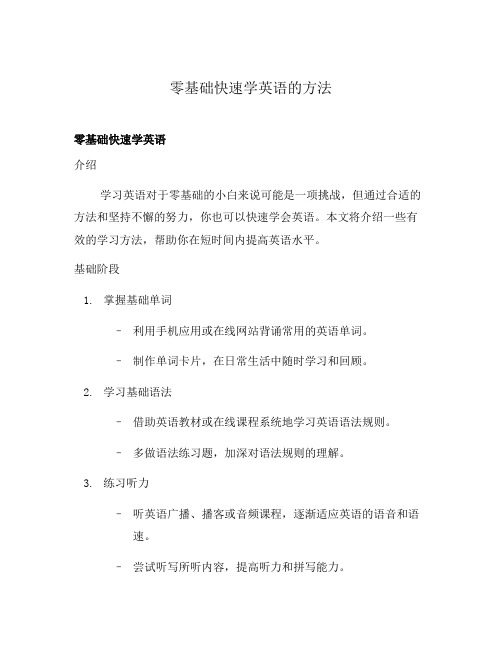
零基础快速学英语的方法零基础快速学英语介绍学习英语对于零基础的小白来说可能是一项挑战,但通过合适的方法和坚持不懈的努力,你也可以快速学会英语。
本文将介绍一些有效的学习方法,帮助你在短时间内提高英语水平。
基础阶段1.掌握基础单词–利用手机应用或在线网站背诵常用的英语单词。
–制作单词卡片,在日常生活中随时学习和回顾。
2.学习基础语法–借助英语教材或在线课程系统地学习英语语法规则。
–多做语法练习题,加深对语法规则的理解。
3.练习听力–听英语广播、播客或音频课程,逐渐适应英语的语音和语速。
–尝试听写所听内容,提高听力和拼写能力。
提高阶段1.阅读英语资料–选择适合自己水平的英语书籍、新闻文章或杂志。
–阅读过程中注意记住生词,并使用词典查阅。
2.参加语言交流活动–加入英语角或与其他英语学习者组织交流活动。
–尝试与使用英语的人进行对话,锻炼口语表达能力。
3.使用学习工具–下载学习应用,如有道词典、Quizlet等,进行单词练习和语法学习。
–听英语播客或观看英语视频,提高听力和口语理解能力。
4.创造英语环境–将手机、电脑等设备切换为英语界面。
–看英语电影、剧集,尽量使用英语进行日常交流。
深入阶段1.学习英语表达习惯–学习英语中常用的习惯说法和俚语。
–阅读英语文章,注意其中的表达方式和惯用法。
2.参加英语考试–准备并参加英语水平考试,如雅思或托福。
–借助考试学习资料和模拟题,提高英语综合能力。
3.沉浸式学习–考虑参加英语国家的语言学习项目或游学活动。
–通过身临其境的学习环境,加速提高英语水平。
结束语学习英语需要持续的努力和坚持,没有捷径可走。
但通过以上方法,你可以快速提高英语水平,为更广阔的发展和交流打下良好基础。
加油!非常抱歉,刚才回答有误。
我将继续完成文章。
结束语学习英语需要持续的努力和坚持,没有捷径可走。
但通过以上方法,你可以快速提高英语水平,为更广阔的发展和交流打下良好基础。
加油!参考资料•[英语流利说](•[扇贝英语](•[Quizlet](以上是一些常用的英语学习平台,供你参考。
怎样学好英语的基础方法

怎样学好英语的基础方法
学好英语的基础方法有以下几点:
1. 建立良好的学习习惯:每天保持一定的学习时间,坚持不懈地学习英语。
2. 培养英语听力与口语能力:多听英语音频、观看英语视频,模仿语音语调,并尽量与他人用英语交流。
3. 背诵和积累词汇:背诵常用的单词、短语和常见的句型,积累词汇量。
4. 刻意练习英语语法:学习基本的英语语法规则,理解句子的结构和用法。
5. 阅读英语文章:选择适合自己水平的英语文章,阅读并理解其中的内容,提高阅读理解能力。
6. 写作练习:通过写英语日记、文章等,提升自己的写作能力。
7. 找到合适的学习资源和学习方法:选择适合自己的英语教材、网课、APP等,寻找适合自己的学习方法。
8. 多与英语母语者交流:参加英语角、找外教,与英语母语者交流,提高口语表达能力。
9. 时刻保持对英语的兴趣:通过听英语歌曲、看英语电影等方
式,保持对英语的兴趣,提高学习动力。
10. 勇于尝试:不怕犯错误,勇于尝试用英语进行交流,接受纠正和改进。
通过以上方法,可以帮助你建立英语学习的基础,不断提高英语能力。
英语零基础学习方法
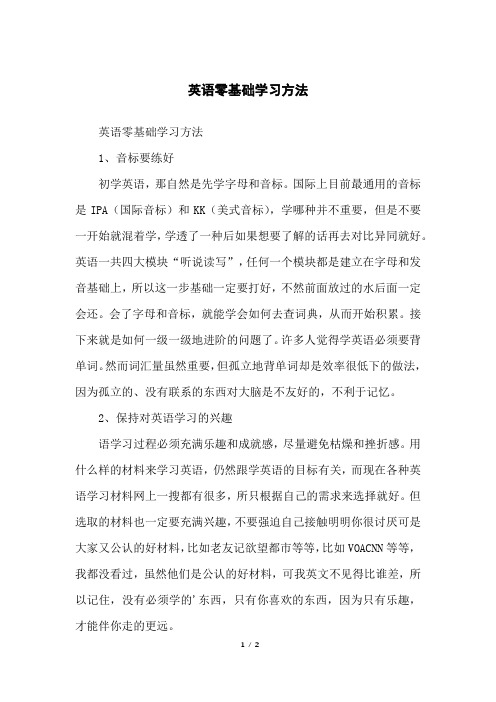
英语零基础学习方法英语零基础学习方法1、音标要练好初学英语,那自然是先学字母和音标。
国际上目前最通用的音标是IPA(国际音标)和KK(美式音标),学哪种并不重要,但是不要一开始就混着学,学透了一种后如果想要了解的话再去对比异同就好。
英语一共四大模块“听说读写”,任何一个模块都是建立在字母和发音基础上,所以这一步基础一定要打好,不然前面放过的水后面一定会还。
会了字母和音标,就能学会如何去查词典,从而开始积累。
接下来就是如何一级一级地进阶的问题了。
许多人觉得学英语必须要背单词。
然而词汇量虽然重要,但孤立地背单词却是效率很低下的做法,因为孤立的、没有联系的东西对大脑是不友好的,不利于记忆。
2、保持对英语学习的兴趣语学习过程必须充满乐趣和成就感,尽量避免枯燥和挫折感。
用什么样的材料来学习英语,仍然跟学英语的目标有关,而现在各种英语学习材料网上一搜都有很多,所只根据自己的需求来选择就好。
但选取的材料也一定要充满兴趣,不要强迫自己接触明明你很讨厌可是大家又公认的好材料,比如老友记欲望都市等等,比如VOACNN等等,我都没看过,虽然他们是公认的好材料,可我英文不见得比谁差,所以记住,没有必须学的'东西,只有你喜欢的东西,因为只有乐趣,才能伴你走的更远。
3、听力、口语也不能落下其实当你有意识来提升听力和口语的时候,已经说明你已经不是零基础了。
所以就合在一起说了,毕竟你已经入门了,相信学英语的你,也会很有成就感,毕竟从前费了好大的力气,也感觉到学英语的力不从心,但是经过这样系统的练习,英语居然一下子就提升了这么多。
口语的话,你平时多和人交流就行,现在微信、facebook这么发达,完全可以勾搭上外国人。
最后就是坚持了,说到底我们不应该把英语看作知识,而应该看成一项技能。
任何一项技能都是靠持续行动、逐步积累,最终达到熟练、精通的。
所以学习英语最怕的并不是方法不对、材料不适合,而是怕半途而废。
许多人在学英语前总想着少走弯路,但其实有些坑必须要自己踩进去,摔了再爬起来,才能够转化成自己内在的能力,而一味想着走捷径,反而更容易掉进陷阱。
初学者如何从零开始学英语
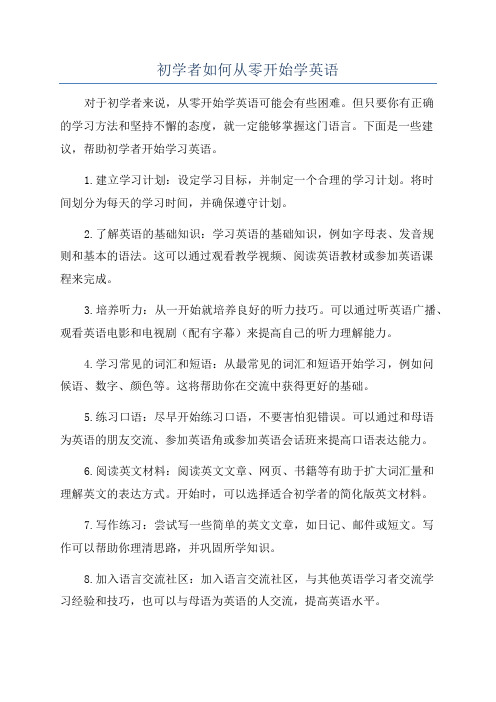
初学者如何从零开始学英语对于初学者来说,从零开始学英语可能会有些困难。
但只要你有正确的学习方法和坚持不懈的态度,就一定能够掌握这门语言。
下面是一些建议,帮助初学者开始学习英语。
1.建立学习计划:设定学习目标,并制定一个合理的学习计划。
将时间划分为每天的学习时间,并确保遵守计划。
2.了解英语的基础知识:学习英语的基础知识,例如字母表、发音规则和基本的语法。
这可以通过观看教学视频、阅读英语教材或参加英语课程来完成。
3.培养听力:从一开始就培养良好的听力技巧。
可以通过听英语广播、观看英语电影和电视剧(配有字幕)来提高自己的听力理解能力。
4.学习常见的词汇和短语:从最常见的词汇和短语开始学习,例如问候语、数字、颜色等。
这将帮助你在交流中获得更好的基础。
5.练习口语:尽早开始练习口语,不要害怕犯错误。
可以通过和母语为英语的朋友交流、参加英语角或参加英语会话班来提高口语表达能力。
6.阅读英文材料:阅读英文文章、网页、书籍等有助于扩大词汇量和理解英文的表达方式。
开始时,可以选择适合初学者的简化版英文材料。
7.写作练习:尝试写一些简单的英文文章,如日记、邮件或短文。
写作可以帮助你理清思路,并巩固所学知识。
8.加入语言交流社区:加入语言交流社区,与其他英语学习者交流学习经验和技巧,也可以与母语为英语的人交流,提高英语水平。
9. 使用学习资源:现在有许多在线学习资源可以帮助你学习英语,如Duolingo、BBC Learning English等。
利用这些资源来提高你的听力、阅读、写作和口语技能。
10.坚持不懈:学习任何一门新语言都需要持久的毅力和耐心。
坚持不懈,并相信自己能够成功。
总之,学习英语需要时间和努力。
选择适合你的学习方法,并保持积极的态度。
随着时间的推移,你会发现自己的进步,并能够流利地运用英语交流。
12种学习英语好方法

12种学习英语好方法学习英语的方法有很多种,我们可以从不同的角度和方法来提高自己的英语水平。
下面是12种学习英语的好方法。
1.多听多读:听力和阅读是学习英语的基础,通过多听多读可以提高对英语语言的理解和识别能力。
可以通过听英语新闻、音频书籍、广播、电视节目等来提高听力,通过读英语杂志、报纸、小说、博客等来提高阅读能力。
2.多说多写:口语和写作是英语的表达方式,可以通过多说多写来提高自己的表达能力。
可以找一个语伴进行英语对话,练习口语表达能力;可以写英语日记、文章,练习写作能力。
3.创造英语环境:在日常生活中创造一个英语环境可以有效提高英语水平。
可以看英语电影、电视剧,听英语歌曲,和英语母语者交流等。
4.利用互联网资源:现在有很多好的互联网资源可以帮助我们学习英语,比如在线课程、学习网站、英语学习APP等。
可以根据自己的需求选择适合自己的资源进行学习。
5.参加英语角:英语角是一个可以和其他学习英语的人一起交流的地方,可以在英语角中练习和他人交流的能力,找到学习英语的伙伴。
6.学习语法和词汇:语法和词汇是英语学习的基础,可以通过学习英语语法知识和扩大词汇量来提高英语水平。
可以购买英语语法书籍,通过刷题等方式进行练习;可以背单词,利用词汇学习APP进行词汇扩充。
7.创造语言输出机会:创造语言输出机会可以帮助我们巩固已学的知识,提高英语表达能力。
可以在语伴或英语角中分享自己的观点,参加演讲比赛等。
8.每天坚持学习:学习英语需要长期坚持,每天都要进行一些学习活动来保持英语水平。
可以每天找一些时间进行听力、口语、阅读、写作等方面的练习。
9.学习语言学习方法:学习英语的方法也需要学习,可以通过学习一些语言学习方法来提高学习效果。
比如,使用记忆法、创造情景记忆等方法来记忆单词;使用划重点、总结等方法来提高阅读效果。
10.看英语可视化素材:可以通过看英语电影、电视剧、纪录片等可视化素材来提高英语水平。
可以提高听力能力,还可以熟悉英语的表达方式和文化背景。
如何学好英语初级
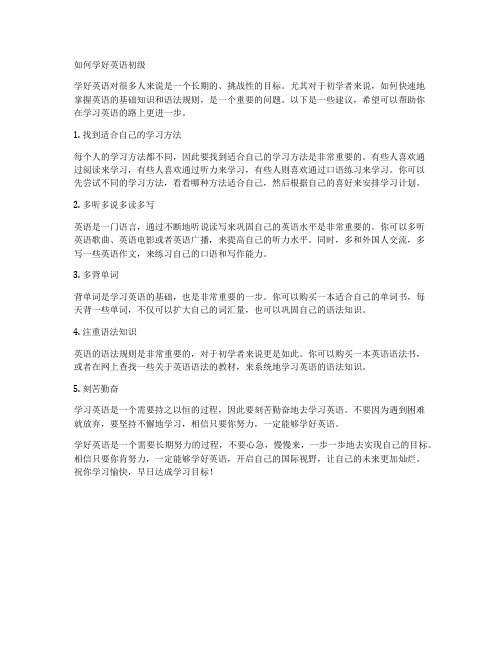
如何学好英语初级学好英语对很多人来说是一个长期的、挑战性的目标。
尤其对于初学者来说,如何快速地掌握英语的基础知识和语法规则,是一个重要的问题。
以下是一些建议,希望可以帮助你在学习英语的路上更进一步。
1. 找到适合自己的学习方法每个人的学习方法都不同,因此要找到适合自己的学习方法是非常重要的。
有些人喜欢通过阅读来学习,有些人喜欢通过听力来学习,有些人则喜欢通过口语练习来学习。
你可以先尝试不同的学习方法,看看哪种方法适合自己,然后根据自己的喜好来安排学习计划。
2. 多听多说多读多写英语是一门语言,通过不断地听说读写来巩固自己的英语水平是非常重要的。
你可以多听英语歌曲、英语电影或者英语广播,来提高自己的听力水平。
同时,多和外国人交流,多写一些英语作文,来练习自己的口语和写作能力。
3. 多背单词背单词是学习英语的基础,也是非常重要的一步。
你可以购买一本适合自己的单词书,每天背一些单词,不仅可以扩大自己的词汇量,也可以巩固自己的语法知识。
4. 注重语法知识英语的语法规则是非常重要的,对于初学者来说更是如此。
你可以购买一本英语语法书,或者在网上查找一些关于英语语法的教材,来系统地学习英语的语法知识。
5. 刻苦勤奋学习英语是一个需要持之以恒的过程,因此要刻苦勤奋地去学习英语。
不要因为遇到困难就放弃,要坚持不懈地学习,相信只要你努力,一定能够学好英语。
学好英语是一个需要长期努力的过程,不要心急,慢慢来,一步一步地去实现自己的目标。
相信只要你肯努力,一定能够学好英语,开启自己的国际视野,让自己的未来更加灿烂。
祝你学习愉快,早日达成学习目标!。
- 1、下载文档前请自行甄别文档内容的完整性,平台不提供额外的编辑、内容补充、找答案等附加服务。
- 2、"仅部分预览"的文档,不可在线预览部分如存在完整性等问题,可反馈申请退款(可完整预览的文档不适用该条件!)。
- 3、如文档侵犯您的权益,请联系客服反馈,我们会尽快为您处理(人工客服工作时间:9:00-18:30)。
英语基础学习方法
:
学习动机是成败的关键
你是学习者,你主导所有的学习,当你罢工时,一切的一切就归零。
所以,要让自己成为一个坚固的堡垒,抵抗外来的侵袭。
外来的侵袭主要是惰性与退缩。
三天捕鱼两天晒网,持续力不够,这是惰性;遇到学习困难就选择放弃,这是退缩。
想要克服,不难,那就是你的心要够坚强。
坚强来自于学习英语的热情。
有一本杂志做过调查,企业主认为自己成功的关键特质是什么?排行第一的特质就是热情!热情会带出坚持与专注,做任何事情就容易成功。
如何点燃热情?我个人认为是动机,内在最深层的想望!想要培养热情,那就找出你的学习动机。
为什么想学好英语?请把动机写下来,这些动机必须够强烈,能够感动你自己。
尔后在学习的过程中,如果遇到困难与不耐烦时,就可以靠着学习的初衷重新灌注自己力量。
学习的动机因人而异,例如,工作需求、旅游、考试、结交朋友、阅读资料等等…。
记得以前一位同事,他说讲英语是他从小的梦想,所以即使已经六十几岁了,他见到人就是说英语。
这样的热情,让人感动,不是吗??
学习英语没有捷径
重头学起,看似简单,但是学习者总是千头万绪,找不到着力点。
我个人认为,首重建立正确的观念。
学习英语没有捷径,也妄想有捷径,必须认清这个事实。
试想,我们花多少时间学习中文,以及多少时间浸染在说中文的环境里,然而大部分人的中文能力也只是普通罢了!更何况,我们是在没有英语环境下学习英语,其困难度之高,不难想像。
所以,学习英语切勿心急,不要好高骛远、囫囵吞枣,必须一步一脚印,靠时间点滴累积,方能有所成就。
基础英语的学习步骤
学习基础英语,一定要从发音开始,语言有了声音,学习就会变得容易。
初学者,我建议学习KK音标。
自然发音法,初学者容易因为母音变化感到困惑;再者,初学英语,外国语音会感到相当的陌生与抽象,如果没有发音符号标示如何发音,单靠耳朵听音,许多初学者会有学习的困难与挫折。
KK音标熟练后,慢慢地就会过渡到自然发音法。
KK音标的拼音原理跟注音符号ㄅㄆㄇㄈ是一样的,一个符号一个单音,真的不难。
发音和基础教材的学习可以同步进行,也就是先有发音基本概念即可,然后在学习基础英语的同时验证发音。
只要学习时间久了,发音自然就会上手。
基础英语的学习方法观念改变> 方法改变> 成功
学习英语没有捷径,但是有方法。
错误的学习方式,事倍功半,辛苦而难成。
在台湾,国、高中的英语学习,均以升学为目的,着重文法的解析以及解题的训练。
常常是,考试
成绩不错,但是听不懂英语,不会说,不会写,大有人在。
由于我们所处的环境并不使用
英语,这是我们学习英语的宿命,无法改变,所以能够改变的就是学习方法。
感谢您的阅读,祝您生活愉快。
